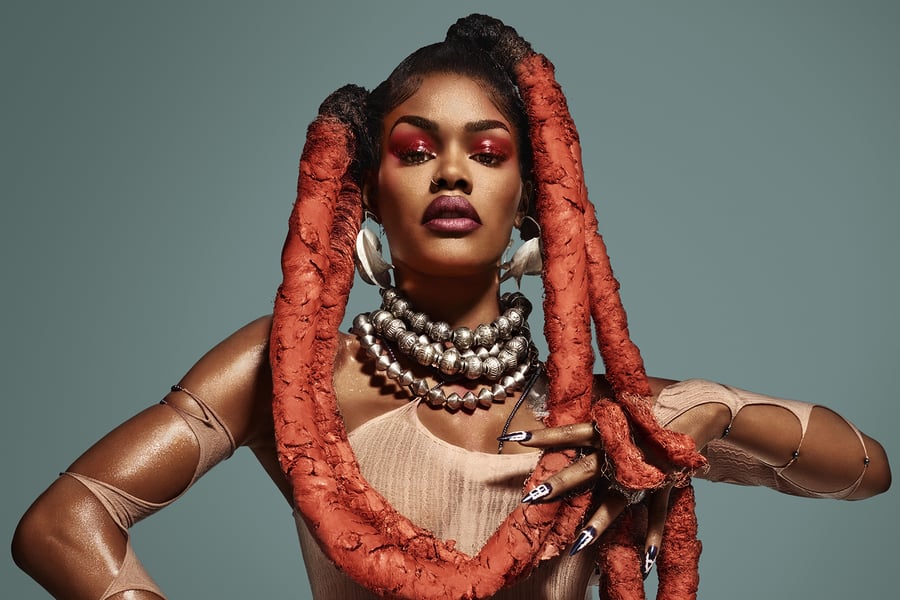Mention Teyana Taylor’s name, and it evokes kinetic experiences: aerobicized thrusts in Kanye West’s “FADE” clip, melting alongside Kehlani in a “Morning” homage to the 1998 camp-classic Wild Things, casually flexing in Jay-Z’s video for “Blue Magic.” As a dancer and model – she launched her career in her teens by choreographing Beyoncé’s “Ring the Alarm” video – Taylor leaves a visual imprint as distinct as anything by Rihanna, Ciara and other doyennes of black pop.
But as a musician, Teyana’s path has been less assured. An early deal with Pharrell’s Star Trek imprint led to the forgettable 2008 single “Google Me” before faltering. Signing with Kanye West’s G.O.O.D. Music led to VII, an uneven debut which featured plenty of star power but no hits. 2018’s K.T.S.E. (Keep the Same Energy) was much better, but its momentum was botched by G.O.O.D. Music’s lackluster promotion.
Part of the reason why K.T.S.E. worked creatively was because of its tight eight-song focus and consistent old-soul sound. It ended with “WTP,” a throbbing tribute to pussy power that matched her salaciousness with rapper Mykki Blanco’s rants. It seemed to auger more collisions on pop’s cutting edge. The looks she adopted in artwork for The Album’s teaser singles – rocking an asymmetrical flat-top like Grace Jones for “We Got Love,” posing with her hair in long twists for “Wake Up Love” – promised as much. But while The Album is billed as Teyana’s long-awaited breakout moment; it doesn’t have the same artistic impact as her visual work, or even the tightly constructed gem that was K.T.S.E.
With 23 songs and an hour-plus running time, The Album soars and sags. It opens with an “Intro” that plays back a recording of her giving birth to her baby daughter as husband Iman Shumpert anxiously calls an operator for assistance. The track sets the album’s themes of personal growth, marital bliss (and occasional discord) as well as erotic fantasies. “Lowkey” has a nice slow jam/babymaker vibe, and the aforementioned “Morning” track finds her trading raunchy lines alongside Kehlani with barely suppressed glee. “1800-ONE-NIGHT” translates her physicality as a dancer into an intensely sexual musical moment. There are a few tracks that also serve as benedictions from elders, like Erykah Badu dispensing wisdom on “Lowkey,” Missy Elliott playing hype woman on “Boomin,” and Lauryn Hill dropping an elastic verse on “We Got Love.”
At certain moments, it sounds as if there’s a better, more dynamic Album waiting to blossom. But it falters near the middle with trapsoul fodder like “Wrong Bitch” and “69.” “Killa” is an Afrobeats cut with Davido that doesn’t quite take off; she comes much harder with a ragamuffin flow on “Bad.” Like so many current R&B artists, her frequent allusions to ‘90s golden age acts like Total (“How You Want It?”), Blaque (“Boomin”) and Lauryn Hill (“Ever Ever”) is both wonderfully sincere homage and troublingly derivative. Mainstream R&B is hardly dead – new albums from Kiada Ledé, dvsn and Kehlani this year prove that – but it still seems stuck in a holding pattern, waiting to assert its creative power with the forcefulness of earlier, more celebrated generations.
Teyana Taylor is a good singer, capable of shifting between a soft lilt on “Lowkey” and a strident punch on “We Got Love.” But she tends to sound like others, particularly Brandy. She hasn’t quite absorbed her influences into a vocal presence all her own. One gets the sense that her music is just part of a total multimedia package, and it’s her choreography where she truly excels.
Maybe that’s enough, though. A recent listening party in Los Angeles brought out plenty of celebrities (and, despite the ongoing pandemic, little social distancing). Cardi B, Quavo, Offset, model Winnie Harlow and others celebrated a woman who has paid plenty of dues and is ready to claim her turn in the spotlight. They’re not wrong.
Love Music?
Get your daily dose of everything happening in Australian/New Zealand music and globally.



































